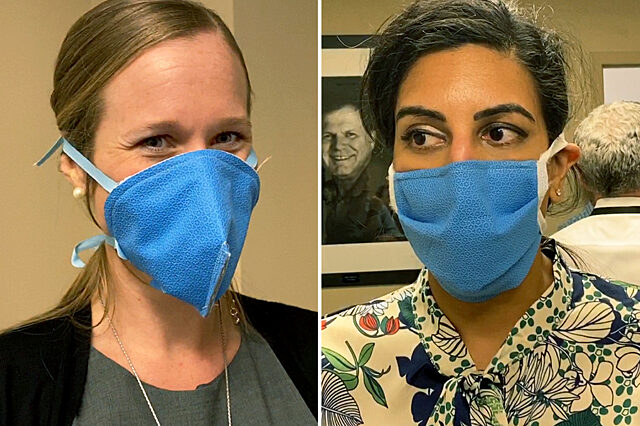UF Health anesthesiology team devises respirator mask made from existing hospital materials

With respiratory masks used by health workers battling the coronavirus in short supply, the University of Florida Health’s department of anesthesiology has developed masks that can be produced in large quantities using materials already found in hospitals and medical facilities.
The innovative masks use Halyard H600 two-ply spun polypropylene that is thought to be superior to the common surgical mask in its ability to block aerosols and droplets, including water, bacteria and other particles.
The material is typically used as sterile wrapping that is normally used to surround surgical instrument trays before they pass through gas sterilization or an autoclave. Although it has undergone rigorous testing and has been assigned a filtering, or N, rating by the manufacturer, it has not been tested for use as a breathed air filter by any regulatory body.
The Halyard material, which comes in 4-by-4-foot sheets, is typically discarded after surgical instrument trays are unwrapped and before coming into contact with patients. About 10 masks can be made from one sheet, and an estimated 500 to 1,000 sheets are likely available from UF Health hospitals every day, said Bruce Spiess, M.D., a professor of anesthesiology in the UF College of Medicine.
“This material is otherwise thrown out, so by taking it, cutting it and making masks out of it, we’ve repurposed it,” said Spiess, who came up with the idea.
Spiess noted that the masks are not certified as an N95 mask and are not intended to replace the N95, but could help fill a need for certain health care workers if a critical shortage of masks were to develop.
“My goal is to promote this throughout the country. Every hospital uses this same material,” Spiess said. With the support of other anesthesiology faculty and staff, a community effort to mass produce the masks is under way. That effort is being led by Nelson N. Algarra, M.D., Cole Dooley, M.D., and Sonia D. Mehta, M.D., assistant professors of anesthesiology in the College of Medicine; Stephanie Gore, M.S.N., R.N., the department patient safety and quality officer; and perfusionist Josene Carlson, C.C.P.
Local crafter and sewist Georgetta Graham has stepped up to help with production and is already sewing prototypes in her home. Kits containing pre-cut pieces of the Halyard material, ribbon or elastic to wrap around the head and a nose wire have been distributed for people to start sewing them in their homes.
The masks are returned to UF Health and individually sterilized by ultraviolet light or autoclave before being distributed to health care providers caring for patients in particular circumstances where an N95 is not required. As people use the masks, they should be either fit tested or pressed as tightly to the face as possible.
Although the sewn masks have been personally N95 fit tested at UF Health and have passed the sweet or bitter taste test akin to what is used for N95 respirators, they are not FDA-approved nor certified as N95 respirators. Further testing is ongoing.
Spiess said he envisions mass dissemination of the masks and invites ingenuity in design. Currently, one prototype is cone-shaped and the other resembles a standard flat surgical mask that folds to the face. Other designs are in development, including ones that would have a 3D-printed face frame.
If you’re Interested in contributing to the success of these efforts, please consider giving to the COVID-19 Masks fund.
About the author
